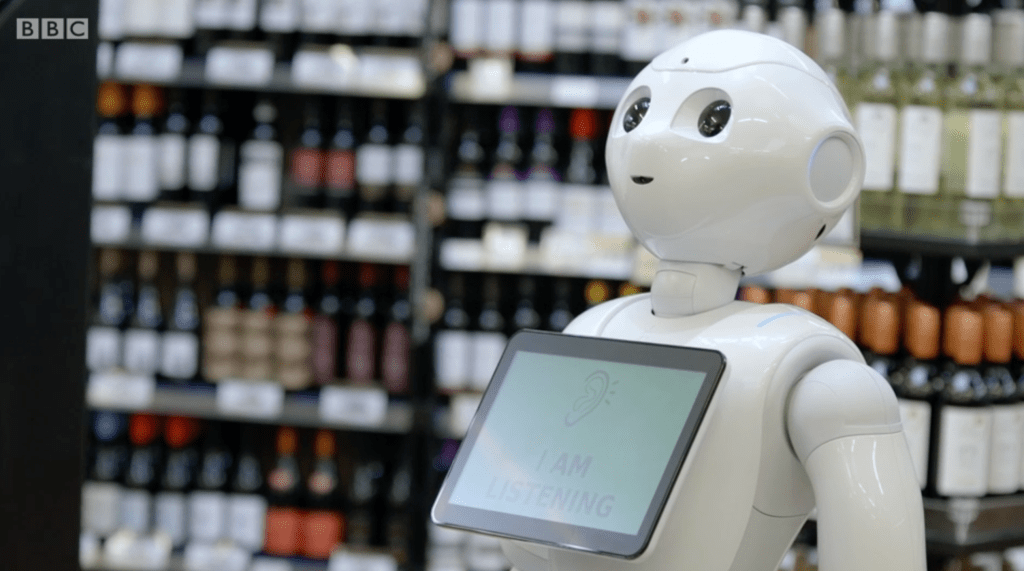If you loved the dinky 58cm tall humanoid robot Nao, there’s good news. Nao’s larger, upgraded compatriot “Pepper” has proved a smash hit in Japan, with all 1,000 units sold in just one minute. But does the Caspar the friendly ghost look-alike have what it takes to go global?
Last week, Chinese e-commerce behemoth Alibaba and Taiwan-based Foxconn Technology Group announced they’d be investing 14.5 billion yen ($117 million) in the robotics division of Japanese telecommunications company SoftBank. (Pepper is made by SoftBank in collaboration with Aldebaran robotics, the French company behind Nao.) The Alibaba, Foxconn and SoftBank trio aim is to bring both emotional robot Pepper and other robotics businesses to a global market.
Videos by VICE
Pepper is a 121 cm tall, 29kg emotional robot equipped with a camera, 3D sensor on its head, a microphone and a touchscreen on its chest. The robot has a 12 hour battery life, is Wi-Fi enabled, and can cruise around at speeds of 2 km per hour, and makes some pretty other-worldly purring and tinkly sounds. Makers say that the robot is able to recognise and respond to human expressions, emotions, and voices.
They envision that Pepper will stand in as classroom assistants and all-round domestic companion to elderly people and families alike. Pepper currently costs 198,000 yen ($1,608), and businesses will be able to rent it for 1,500 yen ($12) an hour. A selection of 200 robot apps are also available for download.
While SoftBank CEO Masayoshi Son said he aimed to “bring more smiles to people around the world” with Pepper, Alibaba Group founder and executive chairman Jack Ma imparted more practical insights. “As we enter the data technology era, robotics will become a critical field that catalyzes technological breakthroughs in numerous sectors such as healthcare, public services, research and at home,” he said in a press statement.
In the past few years, China has increasingly demonstrated its desire to be a global player in the robotics sphere. In 2014, a report by the International Robotics Foundation found that China had already surpassed Japan as the world’s largest manufacturer of industrial robots, with foreign robot suppliers increasing their sales by 20 percent in China in 2012. No wonder Ma has made a strategic move to partner with SoftBank to attempt to bring a legion of Peppers to the world.
But the deal works both ways. Over in Japan, robotics professor and creator of the life-like geminoid robot series Hiroshi Ishiguro commented that Pepper might initially find a broader appeal among the wealthy elite in China rather than in western markets. Ishiguro has already set his sights on China by partnering with a Chinese tech company Shanghai Shenquing Industry to produce his humanoid Yangyang bot, and he hedged a guess that Son might also be looking to expand into the Chinese market.
The long-time advocate of human to robot evolution also said that Pepper presented a step forward in the robotification of Japanese society. “We live in an information society where everybody is using personal computers. But in order to have a robot society, we need to have personal robots with sophisticated functions that are cheap,” Ishiguro told me. “Of course, we need more robots, but Pepper is the first [step].”
Thomas Sorell, a professor of Politics and Philosophy at Warwick University in the UK and a specialist in the ethics of care robots, commented on the difference in robot uptake in Asia and the West, with robots generally being more popular in the former than the latter.
“Pepper is jaunty and friendly and I’m sure that will appeal to a much wider audience,” Sorell told me. “The main factor on whether it will catch on is how expensive it is, and whether it’s likely to fit into a house with a lot of stairs and a lot of obstacle, such as we often have in Europe. I mean if the main market for it were a land of bungalows then I think that that would work better.”
Sorell said that the robot could potentially find a larger market in the United States, where there are more wealthy people. But he remained apprehensive of its uptake by a European audience. “I don’t see the popularity of it for a mainstream population in Europe, where I don’t suppose you’d have a vast number of very wealthy consumers using it,” he said.
In terms of a care context, Sorell was skeptical. “It’s hard to see exactly what kind of functions Pepper would perform because it’s basically a jokey, companionable presence,” he said.
Similar views were also voiced by robotics expert and professor of artificial intelligence at Sheffield University in the UK Noel Sharkey. In a report by the BBC, he said: “There is talk of it being an assistant, but it can’t lift anything, so it is really a very limited companion.”
“There is a big fuss when these things are launched in Japanese care homes, but go back after a year and they are in a cupboard,” he added.
SoftBank is set to roll out its next batch of Peppers sometime in July. While the first batch might’ve been snapped up with lightening-speed, trends often explode and then get snuffed out pretty quickly in Japan. It might just be that this singing, dancing, emotional Pepper bot has a future. But with Sony’s Aibo put to sleep in 2006 after seven years on the market, here’s to hoping that Pepper won’t suffer a similar fate.
CORRECTION: An earlier version of this story miscalculated 14.5 billion yen as equivalent to $12 billion. It is in fact $117 million; the story has been updated to reflect this.
Cool Japan is a column about the quirky and serious happenings in the Japanese scientific, technological and cultural realms. It covers the unknown, the mainstream, and the otherwise interesting developments in Japan.



